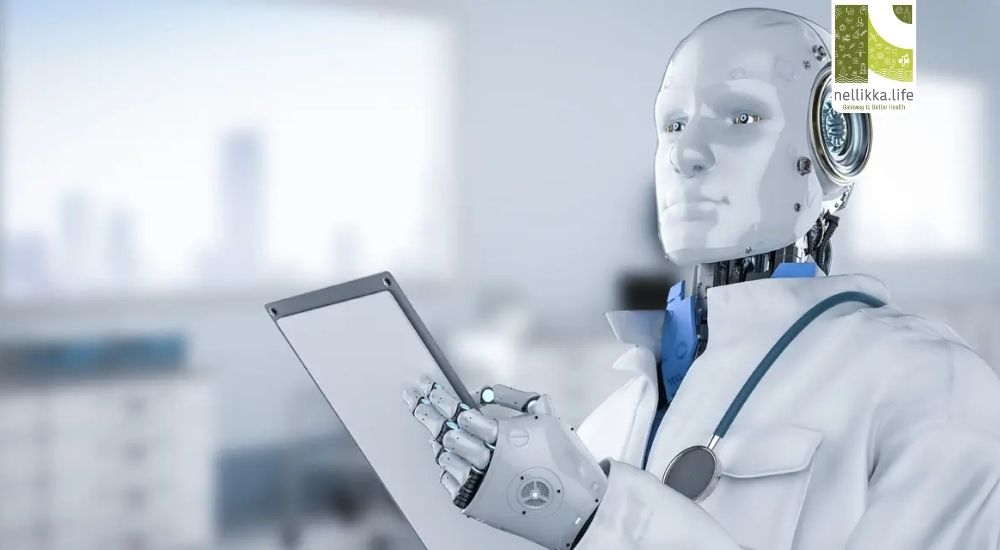AI in Medicine & Health: The Present Pulse

By Dr. Vishad Viswanath,
Chief Editor & MD, Nellikka.life
Sunday Nellikka Editorials
Welcome to another edition of Sunday Nellikka Editorials, a weekly space where we decode the science and soul of modern medicine. This week, we delve into one of the most transformative shifts in healthcare today—Artificial Intelligence (AI). From hospital corridors to remote clinics, AI is reshaping the pulse of modern medicine. Here’s where we stand, and where we’re heading.
AI: From Fiction to Frontline
In 2025, AI is no longer the future—it’s the front page. Clinical practices across the globe are integrating AI tools for diagnosis, documentation, monitoring, and public health outreach. What once seemed like sci-fi has become stethoscope-side reality. But what are the most impactful uses right now? And what ethical and practical concerns are emerging?
1. Superhuman Diagnostics Are Here
AI diagnostic engines are outperforming even experienced clinicians in complex cases. Microsoft’s MAI-DxO (Medical AI Diagnostic Orchestrator), built on the OpenAI O3 model, has shown an 85% accuracy rate in diagnosing rare diseases—compared to a 20% success rate by top-tier clinicians.
It works by mimicking human “chain-of-thought” reasoning, simulating debate among digital agents before arriving at a diagnosis. The implications? Lower diagnostic errors, reduced costs, and faster test recommendations.
Caution: Though promising, these systems need validation in real-world clinical settings and local populations.
2. Early Detection via Retinal Imaging
Startups like Mediwhale, founded by glaucoma survivor Kevin Choi, are using AI to analyze retinal scans and predict risks for heart, kidney, and eye diseases—non-invasively. The eye, they say, is a window to systemic health.
Used in hospitals in South Korea, Dubai, Italy, and Malaysia, this tool helps detect problems before symptoms arise.
Choi emphasizes: AI is an assistant—not a replacement—for doctors.
3. India’s Rural Health Gets a Boost
In Odisha’s Rayagada district, AI-enabled diagnostic kits are being used to monitor maternal and child health in tribal areas. Field workers collect vitals through a mobile app. A central ML algorithm identifies risks and triggers alerts for early intervention.
India is also home to the Garbhini-GA2 model, a fetal age estimation system developed by AIIMS and IIT-Delhi for India’s diverse population. It marks a shift toward culturally relevant AI tools, which consider regional health variables.
4. AI is Freeing Up Doctor Time
Generative AI is being deployed by radiologists to write reports, summarize findings, and even prepare patient communications. Clinics like Heidi Health (Australia) use AI scribes to handle medical documentation and billing—saving time and reducing burnout.
These systems use large language models (LLMs) that are context-aware, reducing errors and improving workflow.
Regulatory bodies still require strict oversight on using AI for actual diagnostic decisions.
5. Trust, Ethics & Liability Remain Grey Areas
Despite the advances, a survey in the Philips Future Health Index 2025 showed:
- 69% of doctors believe in AI’s potential
- But only 38% feel current AI tools meet real clinical needs
- Over 75% are unsure who bears responsibility in case of AI errors
Frameworks like TRIPOD-AI and CONSORT-AI now guide ethical AI research, while global regulations like GDPR, HIPAA, and the upcoming EU AI Act (2026) aim to ensure patient safety and data protection.
At a Glance: Recent Milestones
- Microsoft AI beats doctors in diagnosis – TIME
- Mediwhale retinal diagnostics – Business Insider
- Odisha’s AI health system – Times of India
- Radiology & generative AI – Business Insider
What’s Ahead in AI & Healthcare
From Efficiency to Personalisation
AI is no longer about just speeding things up. With GenAI and predictive modeling, healthcare is shifting to a proactive approach—identifying at-risk individuals before disease strikes.
Remote & Wearable Tech Revolution
Devices like MICA in the UK are combining IoT and AI to deliver real-time patient monitoring. Patients are empowered to manage their own health data via smartwatches and apps.
AI in National Health Systems
The NHS (UK) now officially approves AI tools—like virtual therapy apps and digital weight-loss platforms—under a 10-year plan[1]. India is not far behind, with state-level pilots and national-level research centres growing.
The Ethics Mandate
The 2025 Canada Watch List warns about:
- Algorithmic bias
- Provider accountability
- The environmental impact of AI systems
AI must now meet standards like FUTURE-AI principles: Fairness, Transparency, Explainability, Risk Mitigation.
Nellikka.life’s Call to Action
- Train in AI Literacy
Equip yourself with knowledge in data ethics, AI tools, and digital literacy. - Demand Local Validation
Ensure AI models are tailored to regional populations and healthcare infrastructure. - Advocate for Regulation
Push for clarity on legal responsibilities, error handling, and clinician training. - Collaborate Widely
Foster partnerships between hospitals, governments, researchers, and tech developers.
References:

Final Word
AI as Ally, Not Adversary
AI in medicine is neither magic nor menace—it’s a tool. When implemented ethically and mindfully, it can augment human intelligence, not replace it. Especially in underserved regions, AI can be the catalyst for quality care.
But the human touch? That remains irreplaceable.
Dr. Vishad Viswanath,
Chief Editor & MD, Nellikka.life
Empowering Health through Science, Empathy & Ethics




